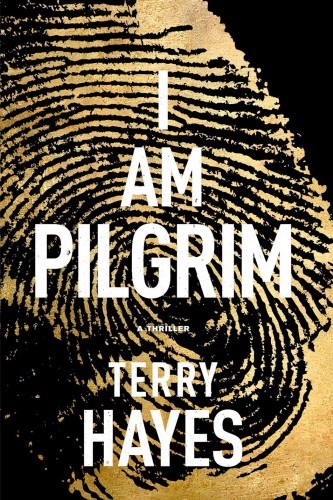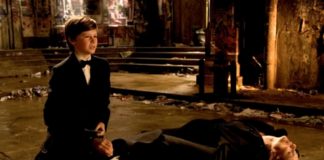It’s the question that keeps so many novelists up late at night: How do you start a thriller? What exactly makes a book grab a reader in the first few pages and leaves them eager to read more?

When I read the thriller I Am Pilgrim by Terry Hayes, I was mesmerized from the first paragraph. Read on to find out 10 specific things that made Chapter One stand out. After all, often the best way to learn how to write is by studying closely what you read.
Background on the Novel
What it is: I Am Pilgrim is a thriller that was published in 2013 by Transworld Publishers in the U.K. It was published in 2014, in the USA, by Emily Bestler Books, a division of Simon & Schuster. The English-born author has also written and produced a number of movies, including Mad Max 2: The Road Warrior and Payback. MGM has already bought screen rights to I Am Pilgrim, which is his debut novel.
The basics about Chapter One
In Chapter One of Part 1 in I Am Pilgrim, we’re introduced to the narrator and the first crime. The length of the chapter is 3.5 pages and is told from the first-person POV of the narrator, who remains unidentified. However, we know that the narrator is investigating the crime without being part of the main team of detectives. Based on details in the chapter, we assume he’s part of a high-level covert ops team.
The 10 things in Chapter One that make the story stand out—and made me want to read more
1. We feel both pity and admiration for the narrator from the first paragraph.
Although we don’t learn in chapter one who the narrator is, we do learn in the first paragraph that he is a man with a lot of experience in dark worlds and traumatic experiences. These worlds have included everything from foster homes and Eight Mile, to places overseas such as ruins known as “the Theater of Death.” Therefore, we assume that he grew up in a troubled environment, then chose to pursue a career of hunting down bad guys. He had a tough childhood, but he overcame it to take on a life of crime fighting.
2. The narrator is an intelligent man with an eloquent way of seeing the world, as well as an excellent memory for details.
What he remembers about the “fancy foster home” is “the endless gardens.” What he remembers about his mother’s bedroom is that it was “on the wrong side of Eight Mile.” When he describes the crime scene, he tells us the exact name of the bleach dumped on the victim, as well as the noises he hears. All of this is filtered through his discerning mind. When he remembers “a Hispanic woman sobbing,” he notes that “even if a victim doesn’t know anyone in the world, it seems like there’s always someone sobbing at a scene like this.” After he runs his fingers along an end table, he can determine with only his nose exactly what product the killer used when he wiped down the wood to eliminate fingerprints.
3. We know that a lot of time has passed since this story occurred, and it was so bad it has stayed with the narrator ever since.
In the second graph he says, “But nothing is burned deeper in my memory than a walk-up in New York—threadbare curtains, cheap furniture, a table loaded with tina and other party drugs.” So, we know that it’s a big story—and one worth listening to.
4. We learn that the killer is an expert, whose talent the narrator admires.
After he observes details about how the killer has concealed the victim’s identity, he is impressed. After he notices that the killer bought all the bottles of bleach from different stores, he says, “I’ve always said it’s hard not to admire good planning.” Later, in another example, he says, “By spraying everything in the room and then dousing the carpet and walls, the killer was making sure that the NYPD needn’t bother with their forensic vacuum cleaners.” So, our guy is up against a strong opponent here.
5. The narrator is connected to pop culture; in other words, he’s still one of us.
He names the victim “Eleanor” in his mind because her death reminds him of the Beatles song Eleanor Rigby (although that reference dates him to the past, or at least says that his taste is dated). He also provides commentary on other things. The wall calendar is “very arty.” The CD collection is in “good taste.” Although the narrator has lived a hard life in worlds that we aren’t familiar with, he’s got an opinion on culture.
6. The narrator has a better sense of judgment than other experts at the crime scene—and he has total access to the crime scene.
The narrator notes that he is able to move freely through “the crush of people,” yet is “unknown to any of them.” This makes us think he has such a high level of security clearance that he doesn’t need to identify himself to them. He also notes that “there isn’t a person in the place who doesn’t think Eleanor was killed during sex.” By telling us this, he distinguishes the fact that he doesn’t draw that assumption for now based on what he sees. So, he’s especially shrewd and patient.
7. He’s an expert on street drugs.
He tells us details about crystal meth—what it looks like, the effects it has on people. This helps us trust that he will give us all the factual knowledge we need to know throughout the book, in order to follow along and play sleuth ourselves.
8. He has a powerful imagination, and he uses it to help him decipher crimes.
In fact, he imagines the entire rape and murder acts taking place in such detail that it suggests he may have sexual issues of his own. Perhaps he might also be attracted to the dark worlds of crime, especially sex crime? This is further reinforced when he says, “In places like this, where you get a feeling that evil still clings to the walls, your mind can veer into strange territory.”
9. He isn’t impressed by wealth.
He describes the victim’s “three-hundred-dollar haircut” and other wealthy details with clinical detachment. He says, “I know this woman. We all do—the type anyway.” His ability to see people as types make us trust him more; he won’t be swayed if a rich, beautiful woman tries to con him. However, he has an expensive jacket slung over his shoulder. So, he could move easily through the world of the rich, too.
10. This is a very dirty and very special crime.
This crime has taken place in a cheap hotel and yet, as the narrator tells us by the end of Chapter One, this crime “is something remarkable.”
Other resources for this novel:
- Terry Hayes’ opinion on the three best spy thrillers, from the Waterstones Blog
- Interview with Terry Hayes on BookaliciousMama.com
- Simon & Schuster’s page for Terry Hayes




